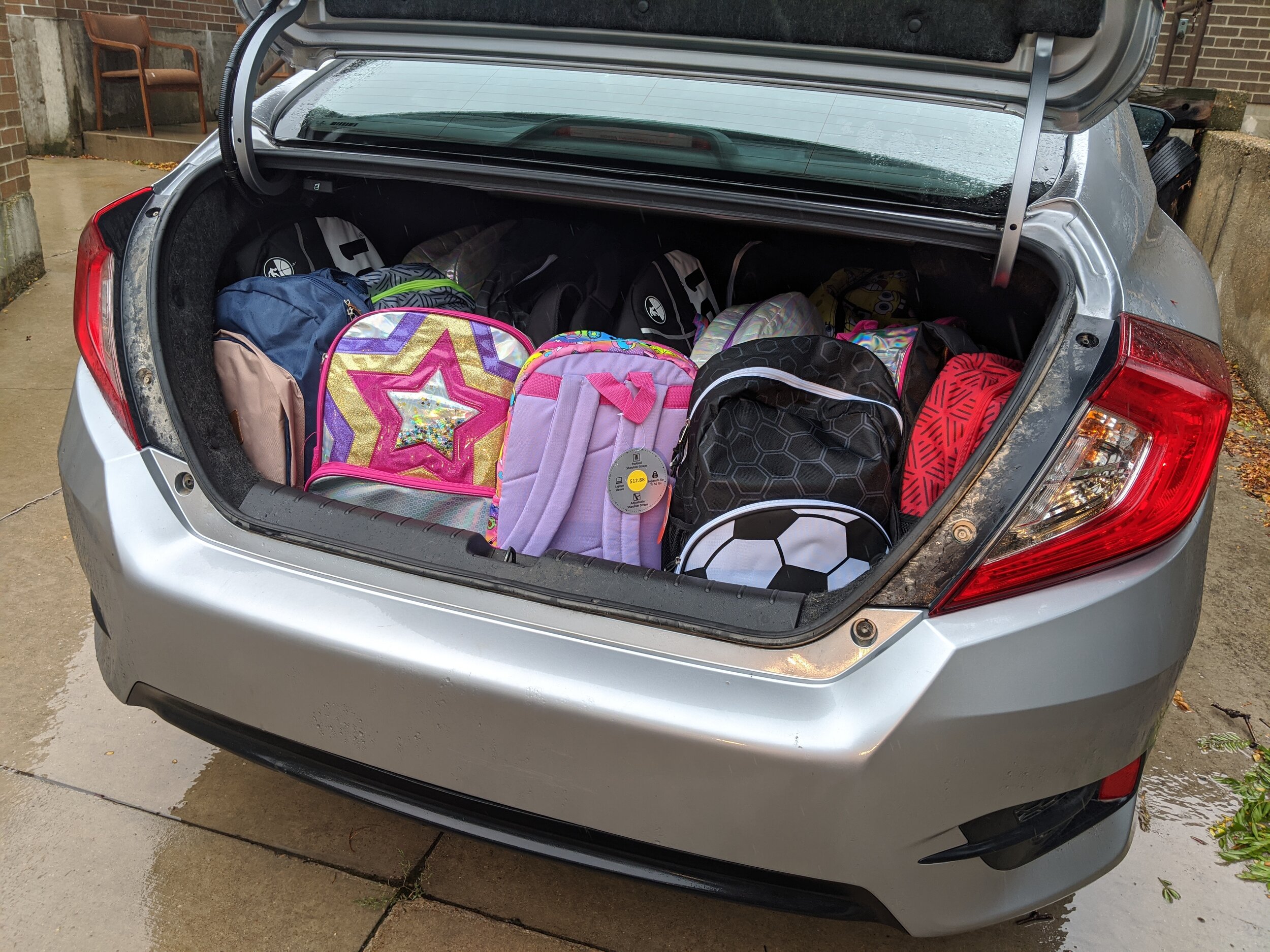The Doxa–Lincoln Story: Building a Successful Church–School Partnership
By Marcia Bosscher
Collaboration Project Story Team
The story of Doxa's partnership with Lincoln Elementary School offers a blueprint of how a church can engage with a community institution and adapt its engagement when a pandemic hits.
Doxa is a two-year-old Madison church plant, but this young church is serious about its mission: "To share the gospel and our lives for the glory of God and the good of Madison," says Sam Roberts, Doxa's Local Missions Director. "Our bread and butter is being a church for the city and the campus."
But how does a church best serve its community?
Roberts, along with lead pastor Rob Warren, consulted Jon Anderson of the Collaboration Project. Anderson counseled them to figure out what the church’s gifting is and run down that track; that's where the work would be most fruitful. Doxa had a surprising number of teachers in its core group along with many young families and college students. Education was a clear gifting. The Adopt-a-School program seemed a good fit.
The church was meeting at the south side Sheraton Hotel. Mary Bartzen, Community Partnerships Director for the Foundation for Madison’s Public Schools, guided their connection to Lincoln Elementary. Roberts had known they needed to partner with a school accessible to college students without a car. Lincoln met the criteria. "If someone could get to the church," Roberts said, "they could get to the school."
"We did a series on our mission statement," Roberts said, describing the beginning of Doxa's involvement in fall of 2019. "On the week we talked about 'for the good of Madison,' I talked about our aspirations for volunteering and had people fill out interest cards." Fifty cards were turned in.
What could the potential volunteers do? Roberts began meeting with Bartzen and Lincoln principal, Deborah Hoffman. Needs were described and direction given. Bartzen gave advice Roberts took seriously: “Under-promise and over-deliver.”
With 50 plus people interested, Roberts set out to make it happen. Knowing that many well-meaning volunteer efforts fall through the cracks, Roberts set out to construct a seamless volunteer sign-up interface on Doxa's website. "I wanted this to be designed so absolutely the only reason you don’t sign up is because you don’t want to do it," he said, "not because you don’t understand how the signup works, or you don’t know where or when to volunteer."
It worked. Some 50 people signed on to either volunteer during the school day—tutoring, helping the teachers, helping with recess or lunch; or to volunteer outside the school day—helping clean the playground, volunteering for Millennium soccer, becoming a Big Brother or Big Sister. Submitted forms went directly to both Roberts and Principal Hoffman.
Clear guidelines were set. "Deb (Principal Hoffman) made it clear," he explained, " 'we don’t allow any of our volunteers to sell anything. With insurance company volunteers, they can’t hand out anything about insurance. Likewise, you guys can’t proselytize while you’re here.' For me, that was fine. Though the mission of our church is to evangelize, it is also the mission of our church to live for the good of our community. I don’t see those things as being at odds."
Hoffman confirmed this. "Doxa has been 100% respectful of separation of church and state, related to supporting students in a public school setting," she wrote. "This is CRITICAL."
After background checks were done, Hoffman matched in-school volunteers with a teacher or staff member, introducing them to each other via email and copying Roberts. Roberts could then follow up if he didn't see the volunteer responding.
After-school volunteers could not begin until spring, but in-school volunteers began serving in January. It was an exciting time. "As soon as any volunteer got to the school at least once," Roberts said, "they were off to the races."
The school was equally enthusiastic.
"Prior to COVID, the mentor/tutor relationships that were being developed were incredible," wrote Hoffman. "Roberts/Doxa have been super organized, thoughtful, and respectful of teachers' time. All of the volunteers from Doxa… do what is asked and not what they necessarily want to be doing, and collaborate with the teacher about what is truly helpful."
The Doxa–Lincoln partnership was beginning strong, inspiring an additional connection with Badger Rock Middle School across the Beltline.
Then COVID-19 hit.
With schools closed down in March, Doxa volunteers could no longer be at the school. "I just kept in touch with Deb," Roberts said, "asking if there is anything we can do to help."
A week later, Doxa started its COVID Relief Fund.
Roberts reached out to Lincoln and Badger Rock. "Can we donate a bunch of gift cards?" Roberts asked. "We’ve got this relief fund, but we know that you’ve got families in your communities that we don’t know." Doxa made multiple donations, keeping the relationships alive.
The summer brought more uncertainty. Pre-COVID, Roberts had asked what Doxa could do for the school in the fall. What would be really helpful, Hoffman had replied, is to provide backpacks filled with supplies. Roberts had plans for a fun in-person event with students, families, and volunteers. But with COVID, plans had to change. And so much was unknown. Would the schools meet in person? What supplies would be needed?
Three weeks before the semester started, Roberts received the supply list. The church considered what they could afford, what an average filled backpack would cost, and how many the church could cover. At the same time, Roberts talked to the principal at Badger Rock about their needs. Badger Rock had been working on activity boxes to supplement online learning. Help purchasing supplies would be very welcome.
With a two-week turn around, Roberts organized Doxa to collect funds—simplifying it by having people 'purchase' a backpack or supply box—and then purchased supplies that a small team packed into backpacks for Lincoln. Doxa sent Badger Rock a check for supplies, as requested.
The partner schools were thrilled. Principal Hoffman wrote, "Materials/supplies/gift cards —all of these have been timely and exactly what was needed. We had backpacks organized, filled, and delivered ready for distribution for students in September. It was AMAZING."
For Roberts, working with the schools fits beautifully into Doxa's vision. "Titus 3 says to encourage our people to be ready for any good work. I’m constantly thinking through how can I disciple everyone in our church, not just the people who are passionate about it." Roberts explained. "I have three basic goals: Was God represented well to the city? Were people actually helped? And were our people discipled to do good works and do justice? The win is when all three happen."
"The reason this connection works," Hoffman wrote in summary, "is that Sam/Doxa listen to our needs and figure out ways to fill them. Often volunteers and donors have their own agenda of how they want to support. Doxa has not had an agenda other than listening to what is needed and trying to meet Lincoln's needs."
With COVID-19 and without COVID-19, Doxa's agenda has been clear: listen to what is needed and do your best to meet those needs.
It's been a win.
Want to learn more and stay connected?
Join the Church + Schools Facebook Group to share ideas and encouragement for how Dane County churches can best support their school partners.
We invite you to partner with us in telling stories that highlight how God is working in and through the local church by supporting Collaboration Project today.



